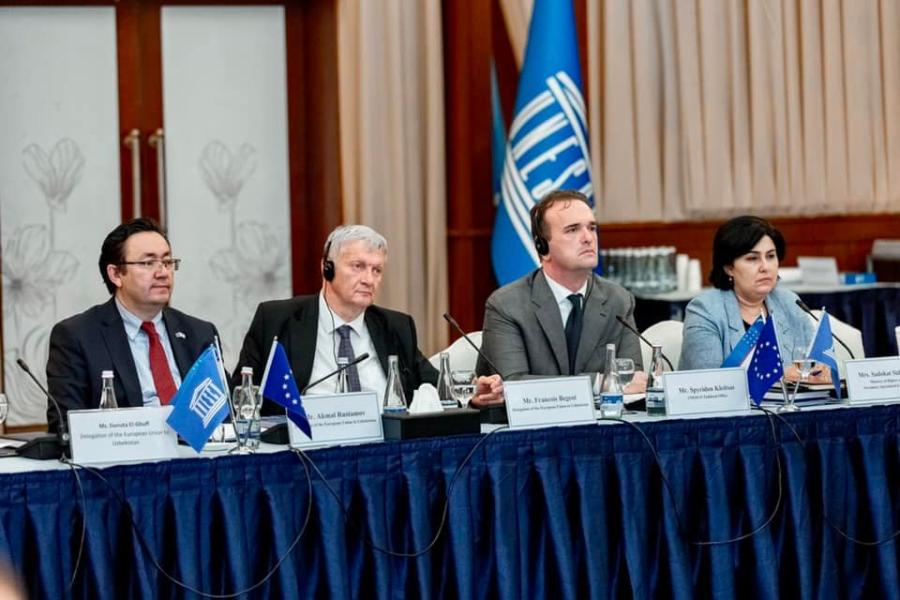EU-UNESCO Joint Project ”Skills Development for Employability in Rural Areas of Uzbekistan” discussed major achievements and plans at the Third Project Steering Committee
23 June 2022
UNESCO Office in Tashkent has conducted the Third Project Steering Committee meeting in the framework of “Skills Development for Employability in Rural Areas of Uzbekistan” Project funded by the European Union.
High-level officials from the Ministries of Higher and Secondary Specialized Education, Agriculture, Water resources, Employment and Labor Relations, and the State Inspection for Supervision of Quality in Education, as well as Representative from UNESCO Headquarter office, Representatives from the European Union Delegation to the Republic of Uzbekistan, and the project stakeholders participated at the event. The Committee reviewed the project progress and achievements in the first half of 2022 as well as the remaining work plan activities for 2022.

In her welcoming speech Ms. Sadokat Siddikova, Deputy Minister of Higher and Secondary Specialized Education and the Chairperson of the Project Steering Committee said that: “We appreciate the contribution of the project to the development of Technical Vocational Education and Training in Uzbekistan. Recent Presidential Decree "On measures to improve the management system of the Ministry of Higher and Secondary Special Education" highlighted the importance of this topic. The Department of Coordination of Vocational Education Institutions was established and we look forward to a fruitful cooperation. On behalf of the Ministry we would like to show our gratitude to all our partners participating at this meeting”.
UNESCO Representative in Uzbekistan a.i. Mr. Alexandros Makarigakis informed participants that TVET strategy was recently completed and shared with Ministry of Higher and Secondary Specialized Education. A draft Technical Vocational Education and Training (TVET) Quality Framework was developed, which will provide the foundation for establishing a National Quality Assurance Framework. Additionally, the project is supporting the operationalization of the Sector Skills Councils in Agriculture and Irrigation sectors and has developed Draft Occupational Maps for the two sectors, in close cooperation with the Institute of Labor Market Research. The development of National Occupational Standards will rely on these maps and is expected to be finalized by the end of 2022. A preliminary infrastructure assessment of the identified pilot colleges in Karakalpakstan Republic, Khorezm, Bukhara, and Surkhandarya regions was done and works are projected to start within the year, when tenders will be prepared. Lastly, together with partner institutions, the project initiated the updating of the curricula and identification of the necessary equipment leading to be procured at a later stage.
Mr. Francois Begeot, Head of Cooperation Section of the European Union Delegation to Uzbekistan expressed his satisfaction with project progress and highlighted that: “This project is strategic for the European Union, since the aim is to train new generation with appropriate skills in agriculture and irrigation sector. That should positively influence on the welfare of population in rural areas and help young people entering the job market”.
Background information about the Project:
UNESCO and the European Union jointly with the Government of Uzbekistan launched the project in 2020. The European Union provided 9.6 million euros with the purpose to implement the project in 2020-2024 in four regions of Uzbekistan: Karakalpakstan, Khorezm, Bukhara, and Surkhandarya. Upon its completion, the project will contribute to enhancement of living standards in rural areas through better employability by equipping women and men with relevant skills for the sustainable, diversified and modernized agriculture with higher productivity.
|
About UNESCO UNESCO was established on 16 November 1945 as a United Nations Specialized Agency. It contributes to the building of peace, the eradication of poverty, sustainable development and intercultural dialogue through education, the sciences, culture, communication and information. UNESCO’s intervention in Uzbekistan is planned and managed by the UNESCO Office in Tashkent in close cooperation with its Headquarters, regional offices in Bangkok, Jakarta and Almaty, and the National Commission of the Republic of Uzbekistan for UNESCO. Website:https://en.unesco.org/fieldoffice/tashkent/tvetuz Telegram: https://t.me/tvetuz For more information please contact: Communication Officer of the project |
|
About the European Union The European Union, composed of 27 Member States, is the world’s biggest aid donor. Uzbekistan has got the bilateral assistance of €76 million for 2021-2024. Uzbekistan also receives regional and thematic assistance in areas like border management and drug control, education, democracy and human rights, energy, transport, SME development, peace and stability and water/environment and nuclear safety. The European Union has been active in Uzbekistan since 1996 and provides approximately EUR 24 million annually in development assistance. Website: http://eeas.europa.eu/delegations/uzbekistan Facebook: www.facebook.com/eudeluzb For more information please contact: Delegation of the European Union to Uzbekistan |







